‘Vulgar, crass, and loud’: why AC/DC were at their best when nobody liked them
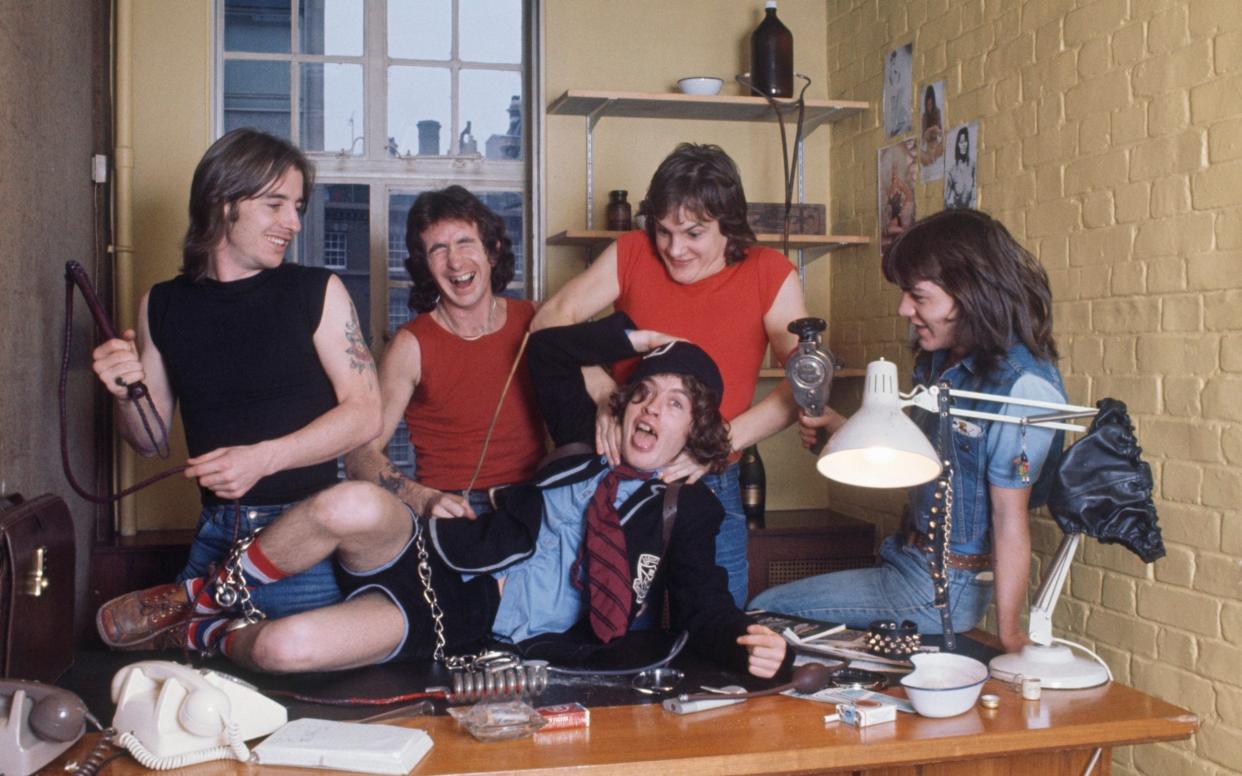
In the spring of 1980, Brian Johnson was a part-time rocker and a full-time roofer whose life was about to change in enormous ways. Offered the job as singer with AC/DC just 38-days after the death of his predecessor Bon Scott (of acute alcohol poisoning) the 32-year old whippet-owning Geordie was given a piece of advice by Malcolm and Angus Young, the group’s fraternal rhythm and lead guitarists.
“You know the first thing [they] said to me when I joined this band?” he recalled to the writer Sylvie Simmons. “They said, ‘Do you mind if you get your feelings hurt?’ I said, ‘Why?’ They said, ‘Because if you join this band you’re going to get f______ stick because we’ve been slagged off by every f______ reporter since we left Australia.’”
It is one of rock’s deepest ironies that at the time when AC/DC were truly remarkable few writers had a kind word to type about them. The Los Angeles Times believed the group to be “a collection of hoary, heavy-rock clichés”. In the UK, Melody Maker decried Scott as “a poor cross between Alex Harvey and Steve Marriot”. The NME had them down as “a bunch of delinquents [who] have only an elementary musical knowledge, write pitifully trite songs, and… are vulgar, crass and loud”.
How things change. Released last week, Power Up, the group’s 17th LP, has been widely applauded in all sections of the press and is the fastest-selling album of the year so far. Despite long-diminished creative energies, in 2020 the weatherworn quintet – combined age: 337 – have attained the status of international treasures. Each new album is celebrated as being the best in years. At least in the case of the new one, it might actually be true.
As immutable as gravity, AC/DC have seen off dozens of trends and fripperies. After soldiers from Delta Force blasted their music at General Manuel Noriega, hiding in the Apostolic Nunciature in Panama City in 1989, they even saw off a military dictator. Having spent almost half a century travelling from Point A to Point A, via Point A, millions of listeners seek reassurance in their enduring immovability. Or if you prefer, “They riff; therefore we are”.
The insularity can sometimes be comical. As Blur and Oasis did battle for the number one spot, in 1995, Brian Johnson confessed to having heard of neither band. Speaking to Kerrang! in 2008, Angus Young revealed that his most recent vinyl purchase was a blues cut from the twenties. The answer given by Malcolm Young to a member of the Beastie Boys seeking permission to sample Back In Black suggested a man wholly unfamiliar with the culture of modern music.
“Malcolm said to them, ‘You’re quite free to do that, there’s nothing can stop you from doing that,’” recalled Angus Young in the book AC/DC: Maximum Rock & Roll. “‘But hey, fella, we know it as Back In Black and all those people out there who bought that album Back In Black’” – and there were 50-million of them – “‘know it as Back In Black. You might call it whatever you call it, but it’s Back In Black.’”
I don’t mean to unduly decry the achievements of the past – what? – four decades, but Back In Black, from 1980, was the last time AC/DC were truly great. With determination to burn and a new singer in tow, the band concluded its attendant world tour barely a year after the death of Bon Scott. But with their lodestar release resident in the US top 10 for 13-months, the LP’s enormous success robbed its authors of a crucial ingredient: hunger. Truth be told, they’ve never been the same since.
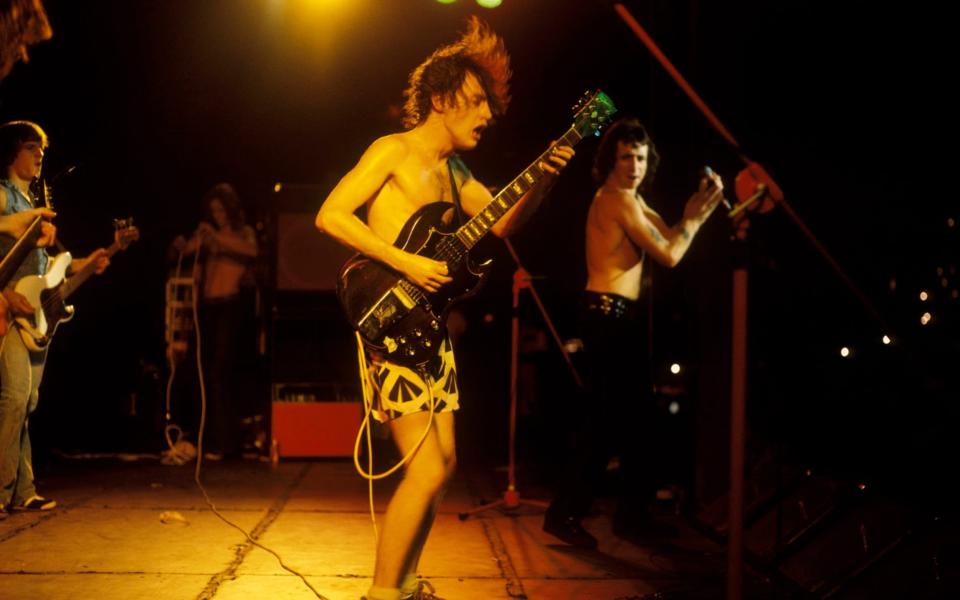
But don’t sweat it; even when mired in mediocrity, the sound made by AC/DC remains special. The degree of space in the music, the simple but unique groove of drummer Phil Rudd, and the expertise with which the musicians play are uncommon gifts. It’s just a shame that save for a smattering of “recent” offerings – Heatseeker, Thunderstruck, Rock’n’Roll Train, Through The Mists Of Time – the songs just ain’t what they were.
Few bands burn as brightly as did early day AC/DC. So the story goes, the first time the Australians played in Britain, at the Red Cow in Hammersmith in the spring of 1976, the audience of 50-people were so impressed that they formed a queue at a phone box outside and told their mates to get to get down to the pub in time for the evening’s second set. When the performers retook the stage, the place was packed.
Sequestered in a communal house in Barnes, the group scrapped with locals, shared lovers, and took whatever gigs came their way. A less combative gang of long-hairs might have been discouraged at finding themselves in the smoke during the first summer of punk. But AC/DC were made of sterner stuff. From Broadcasting House DJ John Peel gave airtime to their debut album, High Voltage. A Monday night residency at the Marquee Club harvested a tenacious following.
“We were always saying that we ain’t a punk band, we’re rock’n’roll,” Malcolm Young told Mojo magazine in 2000. “We were tougher than any of those punks. We used to sit there laughing at these guys who were supposed to be able to bite your head off, thinking, ‘We could just rip the safety [pin] out of his nose and knock the s___ out of him.’”
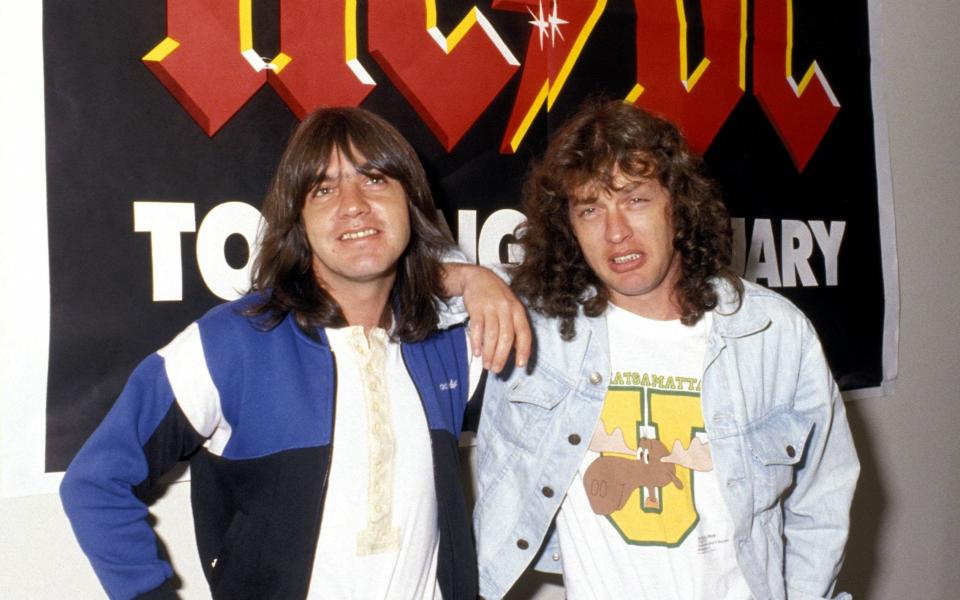
Australia had hardened AC/DC. A 1975 concert at the Council Club Hotel, in Melbourne, ended with the band’s heavily outnumber road crew beating up a gang of skinheads known as the Sharps. In the mining town of Bendigo, the performers played 15-songs while cops combed the crowd in search of a felon armed with a meat-cleaver. Given encounters like these, it’s unlikely they were ever going to be goosed by the sight of a Sex Pistol.
“Those outback places in Australia are the toughest audiences in the world – you have to give them blood,” Angus Young once said. His brother remembered having “to fight our way into the venues to play. [There were] pubs full of rednecks out in the bush, blasting shotguns through the dressing room windows.”
In a way that hasn’t quite been given the attention it deserves, the arrival of AC/DC in London dovetailed nicely with the revolutionary spirit of punk. Like the Pistols and The Clash, they too gave their audience something it had never seen before – in this case, the unvarnished sight and sound of the Australian working class.
I’ve long been taken aback by the affectionate regard in which some listeners hold the group’s early work. The tone suggests a band that has somehow escaped from The Muppet Show. In truth this was a feral union that spelled real trouble for anyone who crossed it. Almost every song AC/DC issued in the seventies is marbled with recklessness. As Bon Scott once sang – convincingly, as it goes - “I got holes in my shoes, I got holes in my teeth, I got holes in my socks, I cant’ get no sleep”.
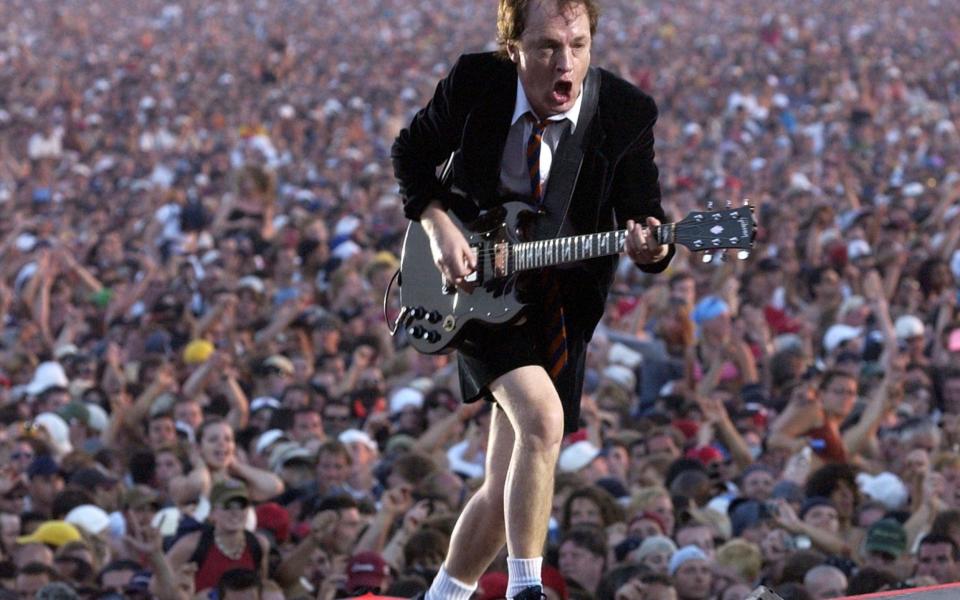
The first time Angus Young saw Ronald Belford Scott was on a television talk show on which he physically attacked a fellow guest. An erstwhile tractor driver, the singer spent a year in jail after stealing a dozen gallons of petrol, endured three days in a coma following a motorcycle crash, and almost died after overdosing on morphine. Living in London in the early 1970s, his friends nicknamed him “Road Test Ronnie” on account of a willingness to sample any drug that came his way.
Sounds lovely, no? Well hang on a minute. “Bon was accepting of anyone, from kids to old people,” said his former wife, Irene Thornton. “He just had a very bubbly personality and a lovely laugh, and he was very quick with a joke.” A former record label CEO remembered the time “my mum came into the office, this old Italian widow, and Bon put his arm around her. He was tattooed, tooth missing [but] his charm was disarming.”
“I don’t think there would have been an AC/DC if it hadn’t been for Bon,” Angus Young has said. “You might have got me and Malcolm doing something, but it wouldn’t have been what it was. Bon molded the character and flavour of [the group]. He was one of the dirtiest [people] I know. When I first met him he couldn’t even speak English – it was all “f___”, “c___”, “p___”, “s___”. [With him in the band] everything became more down to earth and straight-ahead.”
This “character and flavour” reached its peak with the Powerage album. The connoisseur’s LP of choice, its creators attained the level of violent energy required to faithfully record its pulverising songs by chain-smoking cigarettes and speaking ill of acquaintances and strangers alike. To add to the mania, sessions began at eight in the evening and concluded after dawn. Come morning, the musicians sailed boats in Sydney Harbour while casting pitying looks at commuters heading to work.
“George [Young, the album’s producer] would say, ‘Right, do a take now’, because everyone was up to fever pitch,” engineer Mark Opitz told the writers Murray Engleheart and Arnaud Derieux. “They’d just pick a subject to get agro on, whether it be a manager… someone in the music industry [or] someone on TV. They’d pick a point and with that they’d go in and just thrash down a take. It was just magic the way it worked.”
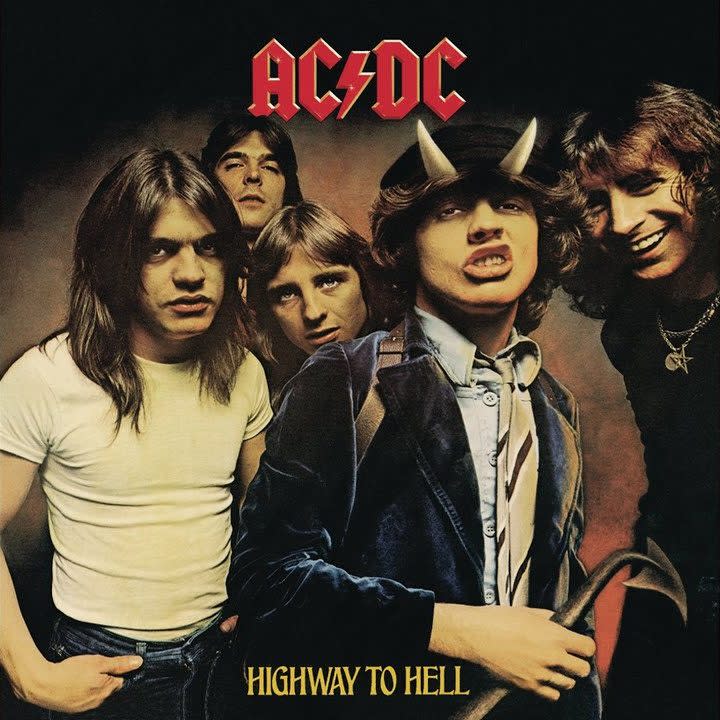
Replete with Bon Scott’s superior phrasing and feloniously underrated lyrics, not to mention Angus Young’s finest guitar solo (Riff Raff), Powerage is AC/DC at their raucous and bloodied best. A year shy of the international success that greeted the release of the Highway To Hell album, from 1979, it is the blazing and dogged sound of a band whose defiance and indomitability is only inches shy of desperation. Like the song says, “I been up to my neck on the railroad track, waitin’ for the train”.
Not that the authors felt the same way. I recall a friend returning from an interview with Malcolm Young, in 1993, and being surprised at the guitarist’s lack of regard for even his most lauded material. “Remind me, what album is Whole Lotta Rosie on?” he’d asked. Next to this, the all but hit-free Powerage didn’t stand a chance. At Bon Scott’s final concert, at the Gaumont Theatre in Southampton, in January 1980, the LP was represented by just one song.
These days there’s more chance of AC/DC striking up a boogie-woogie version of (How Much Is) That Doggy In The Window? than there is of them playing a song such as Up To My Neck In You. I realise that audiences don’t gather in venues such as Wembley Stadium in search of deep cuts, but, come on, the majority of the band’s live show remains unchanged from the first time I saw them, in 1986, as a 14-year old. Since then there’s been more surprises on the Hallmark Channel.
Despite the stagnancy, in the 21st Century the group’s popularity has only grown. In 2003 they were paid half a million pounds to become the first band to headline the Hammersmith Apollo (formerly the Odeon). After insisting that festival organisers erect a stage on which only they were allowed to perform, in 2010 the group trousered a reported four million quid for a fourth appearance at Donington Park. Their most recent tour saw an upgrade from arenas to stadiums across three continents.
It’s a bit of a puzzle, to be honest with you. During these periods the band dealt with the death of Malcolm Young, the (temporary) retirement of Brian Johnson, and eight-months of house-imprisonment for Phil Rudd following a conviction for the possession of methamphetamine. But with surrogates in place – nephew Stevie Young on guitar, Axl Rose on vocals, Chris Slade at the drums - AC/DC barely missed a beat. As well as much else, the sight of a living band being eclipsed by its own branding was a first.
Of course, none of this means a thing when the musicians strike up Hell Ain’t A Bad Place To Be or Shoot To Thrill. From Melbourne to Manchester, no group is better suited to persuading its audience that the outside world no longer exists. In this, they offer escapism in its purest form. Despite the evident ravages of age, when the world finally decides to wake from its slumber I wouldn’t bet against AC/DC taking to the road once more and proving that there’s life in the old gods yet.
My favourite memory comes from a concert at the Globe, in Stockholm, in the winter of 2009. Performing in front of a giant steam engine, I watched in wonder as the band opened their account with Rock’n’Roll Train. It was all there: a balding grey-skinned guitarist dressed as a schoolboy, a singer who looked like Andy Capp’s dad on karaoke night, and a drummer who played deep in the pocket while smoking the gasper protruding from his lips. Friends, it was amazing.
I sent a text message to a wise comrade who loves the group at least as much as his own children. “What,” I asked him, “do you presume is keeping these people alive?” “Simple,” came the answer back. “It’s the magical properties of rock’n’roll."


